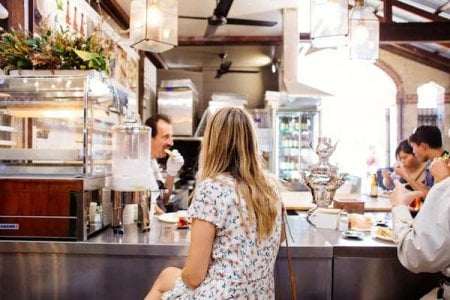Aussies warned over 'necessary evil' bill shocks during ANZAC Day long weekend
By
Danielle F.
- Replies 0
As ANZAC Day long weekend approaches, Australians are gearing up for a well-deserved break.
The ANZAC Day long weekend can be filled with family gatherings, commemorative services, or a meal or a drink at a local establishment.
However, amidst the holiday cheer, there's a financial sting that could catch many off guard.
The public holiday surcharge has become as traditional as the holidays.
Cafes, restaurants, bars, and pubs have been implementing an extra surcharge on these special days.
While some Aussies have accepted this as part of the holiday experience, it remains a contentious issue for many.
According to recent findings from point-of-sale platform Lightspeed, over half of consumers find public holiday surcharges to be 'acceptable'.
Lightspeed's Managing Director, Nicole Buisson, shared that surcharges typically range from 10 to 15 per cent of the total bill.
However, these establishments have no uniform approach, leading to extra costs of as much as 20 per cent.
Data from Lightspeed indicated that bars and pubs were the most likely to add a surcharge (39 per cent), followed closely by restaurants (37 per cent) and cafes (36 per cent).
Bakeries have the least chance to implement holiday surcharges at 24 per cent.
The Australian Competition and Consumer Commission (ACCC) has not applied a cap on these surcharges.
The ACCC only mandated businesses to show the surcharge clearly on their menus.
For business owners, public holidays could be a double-edged sword.
They often see an increase in customers, yet they also face a spike in operating costs due to penalty rate wages.
During public holidays, employees in the hospitality sector should receive 225 to 250 per cent of their base hourly rate.
Queensland-based cafe owner Ruby Rule has been charging customers a 15 per cent surcharge across her three cafes during public holidays.
Rule described these charges as a 'necessary evil'.
She explained that opening on these days often costs her an additional $3,000—some of which is recouped through the surcharge.
On a recent public holiday, Rule's cafes, operating on reduced hours, made $719 from the surcharge.
So, what can you do to avoid the surcharge shock?
It's essential to be aware that these fees only affect the holiday period.
If you're planning to dine out or grab a drink, check the venue's policy in advance.
Those who want to avoid the extra costs should consider hosting a gathering at home.
Alternatively, you may seek out local community events that offer food and festivities.
As Australia honours ANZAC Day, let's also be mindful of our spending.
With a bit of planning and awareness, we can enjoy the holidays without hefty surcharges.

Are you planning to head out during the long weekend of ANZAC Day? Do you have alternative plans so you can save money? Share your plans and experiences with us in the comments below!
The ANZAC Day long weekend can be filled with family gatherings, commemorative services, or a meal or a drink at a local establishment.
However, amidst the holiday cheer, there's a financial sting that could catch many off guard.
The public holiday surcharge has become as traditional as the holidays.
Cafes, restaurants, bars, and pubs have been implementing an extra surcharge on these special days.
While some Aussies have accepted this as part of the holiday experience, it remains a contentious issue for many.
According to recent findings from point-of-sale platform Lightspeed, over half of consumers find public holiday surcharges to be 'acceptable'.
Lightspeed's Managing Director, Nicole Buisson, shared that surcharges typically range from 10 to 15 per cent of the total bill.
However, these establishments have no uniform approach, leading to extra costs of as much as 20 per cent.
Data from Lightspeed indicated that bars and pubs were the most likely to add a surcharge (39 per cent), followed closely by restaurants (37 per cent) and cafes (36 per cent).
Bakeries have the least chance to implement holiday surcharges at 24 per cent.
The Australian Competition and Consumer Commission (ACCC) has not applied a cap on these surcharges.
The ACCC only mandated businesses to show the surcharge clearly on their menus.
For business owners, public holidays could be a double-edged sword.
They often see an increase in customers, yet they also face a spike in operating costs due to penalty rate wages.
During public holidays, employees in the hospitality sector should receive 225 to 250 per cent of their base hourly rate.
Queensland-based cafe owner Ruby Rule has been charging customers a 15 per cent surcharge across her three cafes during public holidays.
Rule described these charges as a 'necessary evil'.
She explained that opening on these days often costs her an additional $3,000—some of which is recouped through the surcharge.
On a recent public holiday, Rule's cafes, operating on reduced hours, made $719 from the surcharge.
So, what can you do to avoid the surcharge shock?
It's essential to be aware that these fees only affect the holiday period.
If you're planning to dine out or grab a drink, check the venue's policy in advance.
Those who want to avoid the extra costs should consider hosting a gathering at home.
Alternatively, you may seek out local community events that offer food and festivities.
As Australia honours ANZAC Day, let's also be mindful of our spending.
With a bit of planning and awareness, we can enjoy the holidays without hefty surcharges.
Key Takeaways
- Aussies have been warned of potential hefty surcharges at hospitality venues over ANZAC Day.
- Public holiday surcharges have been divisive, with 52 per cent of consumers finding them acceptable.
- There's no limit on the amount a business can charge for a public holiday surcharge, but businesses must clearly display the surcharge on their menus.
- Despite the additional revenue from surcharges, businesses like cafes face significant extra operating costs on public holidays due to higher penalty rate wages.








